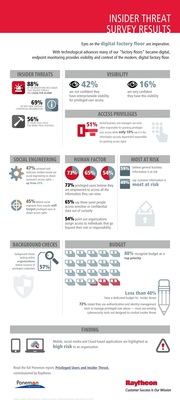<< [Back to News Release Archive]
Insider Threat survey reveals increased awareness but little action
Raytheon-commissioned Ponemon Institute Survey: 88 percent believe privileged user abuse will increase
DULLES, Va., May 20, 2014 /PRNewswire/ -- Despite heightened awareness of insider threats, most organizations continue to grapple with how to mitigate risks to their networks and sensitive information. According to a new report issued today by Raytheon Company (NYSE: RTN), people with access to privileged data – such as health care records, sensitive company information, intellectual property or personal records – frequently put their organization's sensitive information at risk.

Focusing on 'the human factor,' the survey report, "Privileged User Abuse & The Insider Threat", finds that many individuals with the highest levels of network access in organizations are often granted access to data and areas of the network not necessary for their roles and responsibilities. The report reveals that 65% of survey respondents indicated that curiosity – not job necessity – drives these same individuals to access sensitive or confidential data.
"The results of this survey should serve as a wakeup call to every executive with responsibility for protecting company or customer sensitive data," said Jack Harrington, vice president of Cybersecurity and Special Missions, Raytheon Intelligence Information and Services. "While the problem is acutely understood, the solutions are not."
Conducted by information security industry leader Ponemon, the comprehensive survey identified 693 respondents as "privileged users" meaning they are network engineers, database administrators, information-security practitioners and cloud custodians.
Key findings include:
- Eighty-eight percent recognize insider threats as a cause for alarm but have difficulty identifying specific threatening actions by insiders.
- Sixty-nine percent surveyed stated their security tools don't provide enough contextual information to determine intent behind reported incidents and 59 percent stated their tools yield too many false positives.
- Forty-seven percent surveyed said it would be likely that malicious insiders would use social engineering or other measures to obtain someone's access rights – this is up from 21 percent from a 2011 survey.
- Forty-five percent say it is likely social engineers from outside the organization will target privileged users to obtain their access rights.
"Our goal is to also help organizations understand that good people can make mistakes and put sensitive data at risk," Harrington continued. "Even a well-intentioned, seasoned, privileged user with wide access to a network poses great risks because they are high-value targets to corporate 'hacktivists' and persistent adversaries eager to penetrate a company's defenses."
What is most at risk:
- While 59 percent believe general business information is at risk, 49 percent say customer information is most at risk due to a lack of access controls over privileged users.
- Fifty-seven percent believe background checks are lacking in most organizations before issuance of privileged credentials.
- Budget – while 88 percent of those surveyed recognize enhanced security as a top priority, less than half this number (40 percent) have a dedicated budget to invest in enabling technologies to reduce insider threat. Most use existing cybersecurity tools not necessarily designed to combat insider threat; 72 percent stated they use authentication and identity management tools to manage privileged user abuse.
"The goal of this survey is to not only share current insider threat statistics but to educate organizations on their privileged users and the threats and attacks that can happen because of the access they own," said Harrington. "If a privileged user wants to do bad things, their elevated access to the company network makes it easier for them."
Further Information
For a full copy of the study, go to Privileged User Abuse & The Insider Threat. A webcast on June 10 hosted by the SANS Institute will feature analysis of the survey findings from Michael Crouse, Raytheon's Director of Insider Threat Strategies and John Pescatore, Director Emerging Security Trends, SANS Institute. Register for the webcast: Fighting the Insider Threat Privilege Management and Abuse Strategies
In addition, visit us at the Gartner Security and Risk Management Summit where Michael Crouse will present the findings and offer his analysis.
About the Ponemon Institute
The Ponemon Institute is dedicated to advancing responsible information and privacy management practices in business and government. To achieve this objective, the Institute conducts independent research, educates leaders from the private and public sectors, and verifies the privacy and data protection practices of organizations in a variety of industries. For more information, visit http://www.ponemon.org.
About Raytheon
Raytheon Company, with 2013 sales of $24 billion and 63,000 employees worldwide, is a technology and innovation leader specializing in defense, security and civil markets throughout the world. With a history of innovation spanning 92 years, Raytheon provides state-of-the-art electronics, mission systems integration and other capabilities in the areas of sensing; effects; and command, control, communications and intelligence systems, as well as cyber security and a broad range of mission support services. Raytheon is headquartered in Waltham, Mass. For more about Raytheon, visit us at www.raytheon.com and follow us on Twitter @Raytheon.
Media Contact
Jason Kello
+1.571.250.1428
iispr@raytheon.com
Photo - http://photos.prnewswire.com/prnh/20140519/89094
SOURCE Raytheon Company
